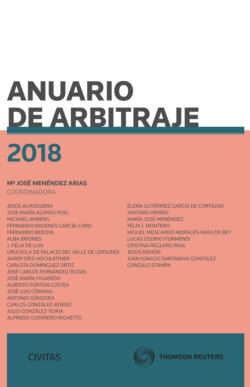Читать книгу Anuario de arbitraje 2018 - Mª José Menéndez Arias - Страница 9
На сайте Литреса книга снята с продажи.
IV. DOES AMERICA DESERVE ALL THE BLAME? DISTINGUISHING AMERICANIZATION FROM JUDICIALIZATION
ОглавлениеBefore we examine just how American international arbitration has become, it may be useful to delineate a few of the factors that have contributed to its current state. The academic literature on the Americanization of international arbitration could be considered a subset of an even larger literature devoted to the «judicialization» of international arbitration24). Judicialization is described as the «increasing tendency for the arbitration process to adopt or follow the formalism and technicalities of national judicial process», with Americanization being the tendency to follow the formalism and technicalities of the US judicial process in particular25). When viewed in the context of the larger trend of judicialization, the intentionality and agency of American practitioners in bringing about the Americanization become more doubtful, and the notion of Americanization itself loses some of its ominousness.
The fact that there exists a larger trend of judicialization in international arbitration that is broader than mere Americanization suggests that factors other than US economic strength are at work. In other words, just because the United States has long floated atop the wave of prosperity set off by the Industrial Revolution –a wave sustained by constant technological innovation that has led to an ever more connected world– does not mean that it (or its legal community) are responsible for all that that wave represents, including current practices in international arbitration.
Take those technological innovations, for example. The explosion in the volume of documents created in carrying out commercial endeavors was caused by a host of digital technologies created by individuals and businesses from all over the world. The unmanageable proliferation of documents involved in complex commercial disputes that is responsible for increasing the costs of litigation and arbitration is attributable to the ease of creating documents digitally. Even if discovery is a uniquely American phenomenon, the use of e-mail and word-processing software is not.
Another major factor in the increased costs and delays in international arbitration is the worldwide expansion of the notion of arbitrability to include new areas of substantive law26). By exposing more areas of law to arbitration, it was inevitable that more complex, high-value cases would be brought to arbitration. When a lot of money is at stake, parties are more willing to use whatever tactics are available to protect their interests27). While some may label a win-at-all-costs mentality as American, it is natural for parties involved in a high-stakes matter to be more willing to take advantage of every tactical advantage they can, regardless of their origin and even if doing so may involve dispensing with civility, gentlemanliness, or efficiency. Thus, while the adversarial American legal system undoubtedly supplies some of the tactics, it cannot claim sole ownership of the motive behind those tactics: the human instinct to pursue or protect, even at great cost, that which we covet or consider ours.
Regardless of whether it is called Americanization or judicialization, many members of the international arbitration community are concerned. However, critics of judicialization or Americanization seem to rely primarily on anecdotal evidence to support their claims28), and some speak in generalities without even providing specific anecdotes of nightmarish «fishing expeditions» or outrageous bullying behavior by counsel. And while critics of judicialization or Americanization do acknowledge that international arbitration remains the most popular form of resolving international business disputes, in pining for a past, simpler era, they do not adequately grapple with the contradiction between their criticism and the tremendous growth in both international commercial and investment-treaty arbitration during the same period in which the Americanization is alleged to have occurred29). Instead, they worry for the future viability of international arbitration30).
So far, the demise of international arbitration has yet to materialize. To the contrary, in 2016, the ICC received 966 new cases involving 3,099 parties from 137 countries, a record for the 94-year-old institution31). This raises two questions: either (1) the Americanization phenomenon is less pronounced than its critics fear, or (2) US-style litigation is not as repellant to parties as its critics seem to think. The next section addresses these questions by looking at various areas of arbitral procedure that are frequently subjected to claims of Americanization.
